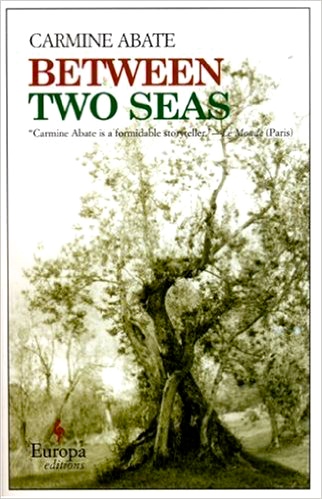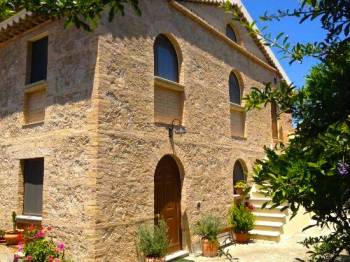Note: On October 23 2016, Carmine Abate was named WINNER of the Italy’s Stresa Prize for Narrative for his newest novel, La Felicita dell’Attesa (The Form of Happiness, not yet available in English).
“What a rich mess my chromosomes turned out to be, what a heady mix of toxic blood was running through my veins!”
 Florian Heumann, the young narrator of this intense and moving study of families and their memories, has just arrived with his family from Hamburg, where he lives, to visit his mother’s ancestral home in southern Italy for a family vacation. His grandfather, Giorgio Bellusci, is absent, but no one will tell him where his grandfather is. All we learn is that his grandfather has been a friend of Hans Heumann, Florian’s other grandfather. Gradually, through flashbacks, the family history unfolds, following numerous generations, all memorably depicted, and their lives in Roccalba, a town in the “toe of Italy” located between the Tyrrhenian and Ionian Seas. Just as the Calabrian peninsula separates the two seas, it also separates the life forces which drive the novel–the sense of romanticism vs. hard-nosed reality, the generosity and love for others vs. long-time vendettas, and the drive to fulfill one’s dreams vs. the loss of one’s dreams due to outside forces.
Florian Heumann, the young narrator of this intense and moving study of families and their memories, has just arrived with his family from Hamburg, where he lives, to visit his mother’s ancestral home in southern Italy for a family vacation. His grandfather, Giorgio Bellusci, is absent, but no one will tell him where his grandfather is. All we learn is that his grandfather has been a friend of Hans Heumann, Florian’s other grandfather. Gradually, through flashbacks, the family history unfolds, following numerous generations, all memorably depicted, and their lives in Roccalba, a town in the “toe of Italy” located between the Tyrrhenian and Ionian Seas. Just as the Calabrian peninsula separates the two seas, it also separates the life forces which drive the novel–the sense of romanticism vs. hard-nosed reality, the generosity and love for others vs. long-time vendettas, and the drive to fulfill one’s dreams vs. the loss of one’s dreams due to outside forces.
 Three generations of Belluscis form the novel’s backbone. In 1835, an early Giorgio Bellusci entertained Alexandre Dumas at the family’s inn, the Fondaco del Fico. The journal, which Dumas left behind, and a sketch made by Jadin, the artist who accompanied him, are now Bellusci family icons. Florian’s grandfather, also named Giorgio, was a young man in the 1950s when he became guide for a traveling photographer, Hans Heumann, who eventually became world famous. Florian, the narrator, is the grandson of both Hans Heumann and Giorgio Bellusci, and he brings the story of the inn and its history to life, uniting all the generations of the past. The Fondaco del Fico was destroyed in a fire during the time of Florian’s grandfather, and it has remained a pile of rubble, taunting Giorgio to rebuild. This becomes an obsession after Giorgio returns from his “absence”–not just because of the inn’s family importance, but because it also symbolizes Giorgio’s determination that his family will never be conquered by outside forces. Ironies underlie the conflicts which arise throughout the novel, providing surprises, shocks, and unexpected twists from beginning to end.
Three generations of Belluscis form the novel’s backbone. In 1835, an early Giorgio Bellusci entertained Alexandre Dumas at the family’s inn, the Fondaco del Fico. The journal, which Dumas left behind, and a sketch made by Jadin, the artist who accompanied him, are now Bellusci family icons. Florian’s grandfather, also named Giorgio, was a young man in the 1950s when he became guide for a traveling photographer, Hans Heumann, who eventually became world famous. Florian, the narrator, is the grandson of both Hans Heumann and Giorgio Bellusci, and he brings the story of the inn and its history to life, uniting all the generations of the past. The Fondaco del Fico was destroyed in a fire during the time of Florian’s grandfather, and it has remained a pile of rubble, taunting Giorgio to rebuild. This becomes an obsession after Giorgio returns from his “absence”–not just because of the inn’s family importance, but because it also symbolizes Giorgio’s determination that his family will never be conquered by outside forces. Ironies underlie the conflicts which arise throughout the novel, providing surprises, shocks, and unexpected twists from beginning to end.
Abate, a great story-teller, creates lively atmospheres and family dynamics. His characters are sensitively developed, and as the narrative flips back and forth in time, the reader becomes involved in an intense family saga concisely rendered in only two hundred pages. Intimate and personal, this ironic novel yet reveals broad themes contrasting the Bellusci family and their values with the people and values of those around them. Violent and tender, cruel and sensitive, thoughtful and instinctive, magical and brutal, the novel reproduces the ancient rhythms of a small Italian town in a remote area populated by people who live by tradition and family values. (This review was originally posted in 2008.)
ALSO by Abate: THE HOMECOMING PARTY
Photos, in order: The author’s photo appears on http://www.filolao.it/
The Calabrian inn, this one in Crotone, is shown on https://www.tripadvisor.com

